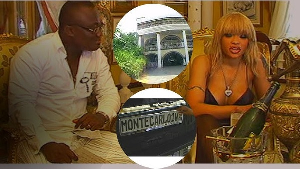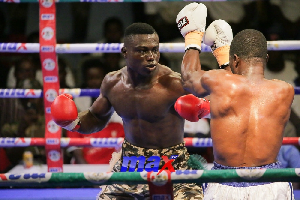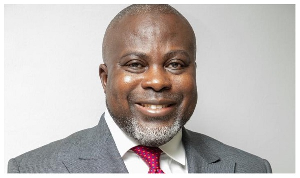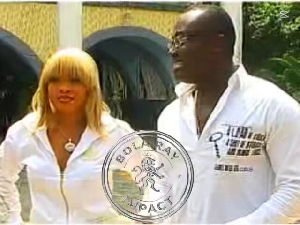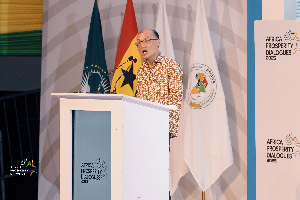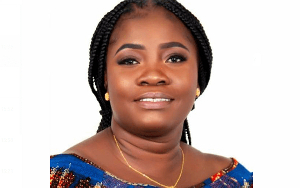Four years have passed so quickly and once again, Ghana our homeland is headed towards another general election, one that would truly test the depth and viability of our infant democracy. Of the various forces readying themselves for a chance at leadership of the state, the New Patriotic Party (NPP), the National Democratic Congress (NDC), the Peoples National Convention (PNC), the Convention Peoples Party (CPP), the National Reform Party (NRP), the Great Consolidated Peoples Party (GCPP) the Every Ghanaian Living Everywhere Party (EGLE) and some independent candidates are bound to set the nation on the edge with excitement through campaigning and propaganda. Nevertheless, it is widely believed that the foremost contenders in this race are the NPP and the NDC. Reasons for this are myriad, the most important of which hinge on their parliamentary strengths and organizational abilities.
Nevertheless, while it is true that the NDC campaign is on the march and attempting to shake itself off the stigma of kleptocracy, insensitivity to the plight of the people and the use of unprintable invectives and tactics to cower opponents, the ruling NPP appears to be riding a tight rope and marshalling a tremendous arsenal that would engender ?victory 2005? come January next year. It is the opinion of yours truly that based on the prevailing circumstances and certain factors that are yet to be dealt with by the NDC thoroughly, the NPP would once again ride to victory in a decisive way, barring any ?dark horse? surprises from the likes of, no not the PNC; it can dream on but yes the GCPP. Take it or leave it, the GCPP has carved a niche for itself in simplifying issues that the ordinary Ghanaian can readily identify with without resorting to unnecessary showmanship or ?big talk? so that just for the sheer fun of it. But perhaps due to the salience of their message, the ordinary Ghanaian bereft of alternatives between the leading contenders would opt for the GCPP. After all, its leadership, if personalities are really an issue in Ghanaian politics does not have to deal with defections and association with any of the leading contenders since multiparty democracy was restored in 1992.
So the question remains as to why the NPP is bound to win. It was interesting reading between the lines to find that James Wolfenson has given what amounts to an endorsement of the Kufuor administration?s efforts so far. The reality of today?s global marketplace is that those who are disposed towards promotion of liberalism shall and do receive the support of those who determine where international capital berths. In that regard, Wolfenson?s promise of releasing $500 million immediately out of a total $1.7billion is an interesting indicator of the trust reposed in the NPP government by the international community. Those who thought the so-called junketing around of H.E President J.A Kufuor was without rewards must seriously be revising their notes by now. In one fell swoop, the government has added a real indicator of what its policies have produced to further improve the lot of our masses: at least this statement was not made in the boardrooms across the street here in Washington in either the IMF headquarters or the World Banks stronghold; it was made right there in Ogyakrom Ghana, in the full glare of the media and knowing how Ghana?s politics works, it is only obvious that the NPP propaganda machinery would flood the screens and sets of individuals with these realities when the time comes.
Within the context of investment, the high marks scored by the NPP government regarding disbursement and application of HIPC funds are a telling eye opener to an in-depth understanding of the initiative and a resolute determination to suit it to the needs of the state. Although disparities do exist in the volume of funds distributed to the regions, it is a fact that no single region or for that matter assembly has been denied access to and benefit from the funds. With the bulk of our population seeing the benefits of this policy at the macro level, it stands to reason that the NPP would capitalize on this to garner even more votes in areas that have clearly benefited from the largesse bequeathed by the policy.
True to its word, the NPP government has finally implemented the long awaited National Insurance Scheme to replace the notorious ?ko fie ko wu? cash and carry system. As some are wont to say, ?better late than never? and to know that the government has voted seed money to subsidize the program after running it on pilot basis in selected regions shows that the policy was not rushed through as some are wont to imply. Today, the ordinary man including our friends looking up to their retirement benefits from SSNIT have little or no cause to worry that their life savings for a rainy day would be whittled away under dubious circumstances; if there should be anything at all, we shall succeed in saving lives and that is essentially what the scheme is about!
Novelties
Before 2000, there was an impression that the ruling government was an insensitive one, having refused to accede to the demands of the general populace in several issue areas. For example, the fact that the security agencies constantly cried for help stating over and over again that with the requisite equipment and facilities, they could stem the tsunami of crime that had engulfed our beautiful state but received no meaningful response gave the impression that only personal security of some ?big shots? mattered. How can we in this day and age justify the senseless murder of our mothers under the ever so watchful eyes of a government that had the greatest credibility in fishing our potential coup makers and yet could not finger out those who were responsible for these tragic deaths. The statement that members of the NPP (while in opposition) were responsible is total hogwash for the business of government is to protect its citizens so that for a government to know perpetrators of such dastardly acts and still refuse to do something about it despite demonstrations and the like speaks volumes about its priorities. Ghanaians are no fools and the NDC did pay dearly for this warped logic. Today, even the armed robbers are careful about plying their trade because not only is the citizenry more vigilant but the days of ?Massa we no get car? that the counter back officials used to throw back at complainants is almost a thing of the past. Knowing that our police force would soon take delivery of an operational state-of-the-art air unit is refreshingly heartwarming; there shall be no more highway heists to rid hardworking individuals and companies of their sweat and toil. That dear reader, is an election-winning card! If there is one thing that would stand the NPP miles ahead of its competitors, it is the air of freedom that they have breathed down the body politic in fulfillment of their promise to repeal the notorious section 185 of the archaic criminal code. Today, a certain intellectual can actually go on air and mar the chances of his Presidential Candidate, another very very fine gentleman by calling the sitting president ?dumb? and get away with it. One wonders what would have happened to a member of the opposition if that statement had been reversed and redirected to our only surviving ex-President in 1998. I dread to think of the consequences; after all in the full glare of the international press and media, we saw what happened to the late K.N Arkaah during our independence celebration. How much more some Akufo Addo or Apraku making such a statement! Press freedom has reached such unbelievable levels that today, the Ghanaian press has become a criteria by which freedom is assessed here in the west. How refreshing! Even the BBC is unusually jealous a la David Kelly!It would be a travesty not to partake in the debate within the Ghanaian Diaspora about our continued disenfranchisement in the wake of protests against the NPP government?s attempt to ?rush through? with this all-important policy. That the opposition parties coalesced around the issue to present a united opposition that saw withdrawal of the proposal is testimony to the maturity of our democracy despite its other shortcomings. The essence of this is simply that for the first time in so many years, we have a government that does not only care and is sensitive to public opinion but LISTENS!!! Listening to your political peers and the logic of good judgment is a rarity in our part of the world and although some circles have vowed to withhold funds from the parties that militated against the policy, the government has demonstrated yet again that it does pay attention to the voice of the people. That again is a confidence building measure, which I am sure, is not lost on the voter. Clearly a voter is more likely to trust such a government with his/her vote knowing well that alternative opinion would not be treated with contempt as used to happen in the past.
Beneficiary Votes
This article has sought to adduce some reasons for which the NPP is very likely to be overwhelmingly returned to power in the upcoming general elections. Nonetheless there are specific social groups that would ensure that at least the level of support the NPP received in 2000 is maintained if not dramatically improved to give it even more power to implement its policies without hindrance. The most important social group in this respect are the cocoa farmers and their dependants. The reasons are obvious: the government has not only hiked the producer price of the golden pod but took the rare initiative of a nationwide free spraying program that has obviously yielded fruit. The argument that the instability in neighbouring Ivory Coast caused this does not hold water; if for anything at all, it simply reinforced the logic of the government?if you get your act right, all others simply follow. In any case no one should forget the circumstances that allowed Ivory Coast to overtake us in cocoa production. Our resolve to remain united in the face of internal threats is what has partially contributed to our success. Coupled with handsome prices at the national farmers day, who in his/her right mind from that group would not vote for the government? Those doctrinaire ideologues who came riding on the backs of egalitarianism and ended up out-monopolizing monopolies in their buying and dare I say cheating sprees that left the poor but hardworking cocoa farmer wondering whether to down tools or not must really be seething with anger at these developments but as adduced above, the business of government (and a liberal one at that) is above all to create a truly enabling environment for capital to work its way into the crevices of every aspect of the economy: the easy syndication of loans for the cocoa season by certain banks in Ghana bears ample testimony to the correctness of the NPP?s policies. Back to Osu they zoom!Shockwaves
The real test of Dan Botwe?s theory of 140 seats ?hands down? is not to be found in the creation of new districts as some have intoned simply because these new areas have their own dynamics that would play out in the coming years. Obviously the loss of control by some entities over certain areas is not welcome news while some are over themselves with joy that they have been elevated. Thus, only a mixed result can be expected from that angle. The real shockwave in this writer?s view is to be found in the Volta region, where for the first time, a so-called pro-Ashanti government has done what the so-called pro-Ewe government did not do: give the good people of Keta a respite from the vagaries of the waves. With the right campaign message, buttressed by evidence of the project, and a marketable non-party but constituency elected candidate, I suspect very strongly that my good friend Dan Abodakpi might be in serious trouble. If Keta falls to the NPP, I shudder to think what would happen to the rest of the Volta region because evidence since the 1992 elections have shown that coastal areas vote en bloc. For example, in 1992, all the electoral areas of Greater Accra extending towards the eastern tip of Ghana voted NDC; the same happened in 1996. In 2000 however, en bloc votes in Accra went to the NPP with slight modifications. It does appear that this would be replicated in the Volta region if the winning formula being espoused by some colleagues here does see the light of day.Contrary to what has been doing the rounds lately that the same old campaign message used in 2000 would be churned out to the voting public by the NPP, your truly is privy to a real shockwave that would blow anything to be used by the NDC to smithereens. To drop a little hint, the return to Accra by hardcore well steeped organizers and results oriented dynamic youth including the likes of Fiifi Ellis, Asante-Manu, Mfoafo MacCarthy, Carlo Wang and a host of many others are bound to bring smiles to the face of the Dan Botwe?s and Lord Commey?s. That this group worked assiduously to mobilize funds for the 2000 onslaught from their positions in the Ghana Cyber Group globally and internally in places it would be unwise to disclose now and still managed to achieve success under dire circumstances underpins the idea that with the situation now better and the circumstances even more workable, there would be some real merry making in the National Headquarters at Kokomlemle. The research directorate of the NDC must certainly be on guard. Winners are emplaning back to town and in the castle shall remain H.E President J.A Kufuor come 2005! Fears
No dear reader, my fears are not hinged on any unfortunate gimmicks by losers and their disenchanted supporters. Ghana is electorally more matured than that for if it is indeed true that the rabble rousers of contemporary Ghanaian politics are of the NDC stock, then that notion was effectively debunked when the NDC conceded defeat and ?hand(ed) over power to whom?? in 2000. The fear I have is about the subtle emergence and informal institutionalization of an 8year tenure of office for a ruling party. Although some circles are likely to dispute it, it can be argued that the NDC should and would have lost as far back as 1996 save for the position of the voting populace that ?he should be allowed to just finish his remaining four years and go?saa akwaa nu de oye patapaa? (literal translation from twi). What we may have unconsciously done is to have created this impression that elected governments cannot fully deliver in 4 years and hence must be given the benefit of the doubt thereby creating an 8year tenure of office. If this notion holds true, certainly H.E President Kufuor has yet another reason to sleep well, knowing for sure that he would be returned to the headaches of leading a state. However, it would mean that Ghana would be racing against time in its quest to catch up with the rest of the world because we have imbibed and become used to this fear of changing rulers ?mid-way?. Of course the NDC cannot capitalize on this at this time for obvious reasons; they introduced it, enjoyed it and know very well that even 8 years were not enough to solve the problems they had created and inherited from themselves. It is in the light of this trend that yours truly believes that the real test for Ghana?s electoral politics would start in 2008 when new battle lines would be drawn, granted all registered parties remain intact and avoid slipping the path of splinter groups that has characterized the likes of the CPP since its overthrow in 1966. To the implications of 2008 and beyond, yours truly shall return presently.







